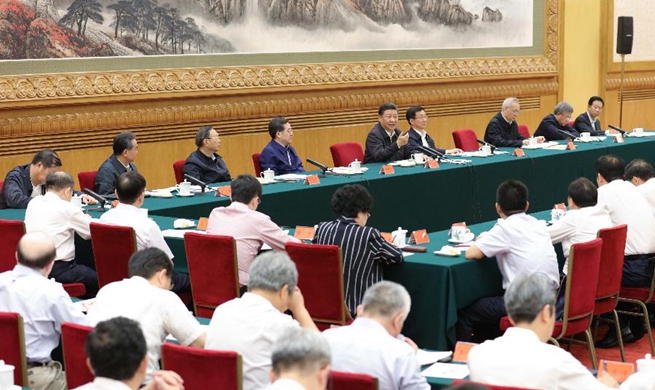BERLIN, Aug. 28 (Xinhua) -- The Federation of German Industries (BDI) has warned the federal government on Tuesday against promising citizens long-term pensions increases which would lead to a significantly higher tax burden on companies and workers.
"It is unnecessary to offer half-baked promises on retirement schemes which would have to be tax-financed on the backs of younger generations," BDI director Joachim Lang told the press in Berlin.
Instead, Lang urged the ruling cabinet of chancellor Angela Merkel to make use of record government budget surpluses to reduce taxes in Germany.
"Since the beginning of the economic recovery, which is currently in its ninth year, the volume of tax receipts has grown by 40 percent. The tax burden shouldered by companies even grew by around 60 percent," Lang complained.
As a consequence, Germany was increasingly at risk of falling behind as an international investment destination compared with countries like the United States where legislators had recently lowered corporation taxes. "The time has come to grant our companies some relief in order to ensure investment, prosperity and opportunity," the BDI director argued.
Lang's comments were made shortly after the magazine "SPIEGEL" reported that Finance Minister Olaf Scholz (SPD) is preparing to announce fresh taxes as a means to guarantee all German retirees receive a pension level equivalent to 48 percent of their current income. Concrete options mulled to implement a corresponding pledge by the "grand coalition" included lifting value added taxes (VAT) in Germany and re-instating a recently abolished and controversial "solidarity surcharge" worth roughly 20 billion euros per year.
So far, Scholz opposes calls by some demographic experts to raise the German retirement age, rather than spending more public money on the country's rapidly growing cohort of pensioners. The SPD politician has gone as far as to demand an extension of the timeframe in which his ambitious 48 percent ratio applied until 2040. Senior representatives of the Christian Democratic Union (CDU), Christian Social Union (CSU) and German Social Democrats (SPD) are scheduled to hold preliminary talks on the issue in Berlin on Tuesday night (CET).
However, several prominent academic experts have already voiced sharp criticism against Scholz' only vaguely-outlined proposals. Bernd Raffelhueschen, professor of economics at the University of Freiburg, cautioned that a pension level equivalent to 48 percent of their current income would be "unaffordable and unfair for younger generations."
"Young employees would face an even higher fiscal burden and the acceptance of the pensions system would decline," Raffelhueschen said.
Speaking to the "Redaktionsnetzwerk Deutschland" on Tuesday, Marcel Fratzscher, president of the German Institute for Economic Research (DIW) argued that the stabilization of the pensions system sought by Schulz could only be achieved in sustainable fashion if the retirement age rose as well.
"An increase in life expectancy by one year requires an increase in the working life period of eight months in order to stabilize the level of pensions without imposing a greater fiscal burden on young people. This is something which (the government) cannot simply ignore," Fratzscher said.
Nevertheless, Ver.di trade union president Frank Bsirske welcomed Scholz' proposals in the "Passauer Neue Presse" to offer a 48 percent pensions guarantee until 2040. "What is it about (the proposal to stabilize pensions) that is supposed to make citizens feel insecure?" Bsirske asked.
Scholz has described a successful overhaul of the German pensions system as being critical to alleviate citizens' concerns about socio-economic inequality and hence prevent the rise to power of a populist politician in the country. Although his proposals were mainly intended to spark a public debate, the precise outcome of which was still unclear, the ultimate objective thereof was to nip "populist tendencies" in the bud.
Merkel has said that her government will prioritize pensions system reform without intervening in the work of a specially-appointed independent expert commission. The 2020s are set to become a critical period for the German social insurance system when a large number of citizens are expected to retire.













